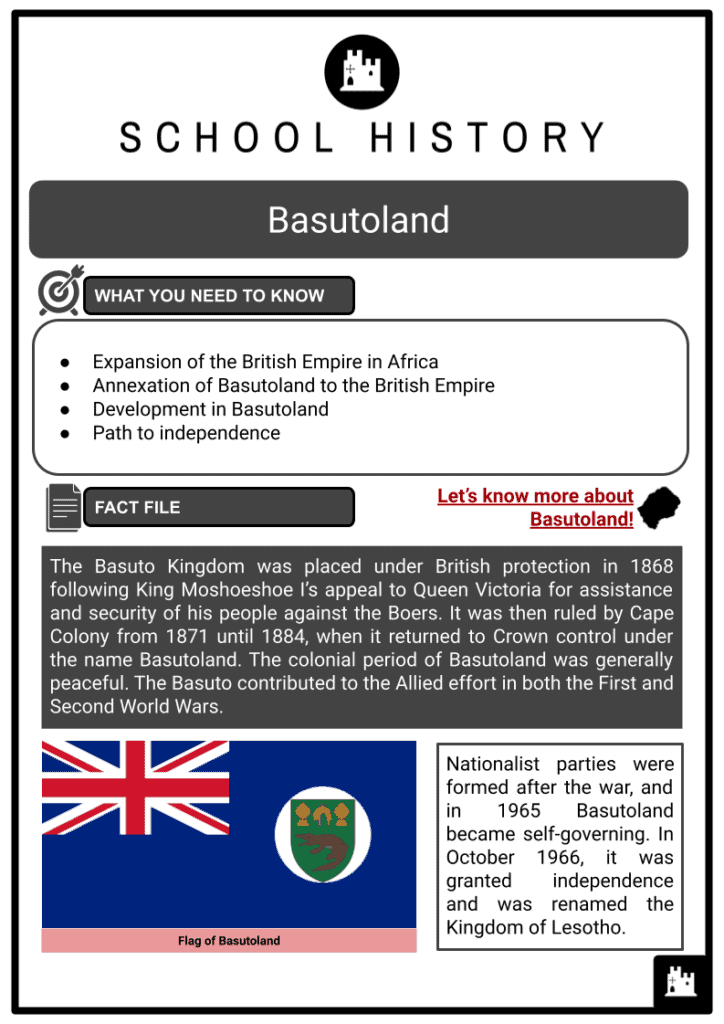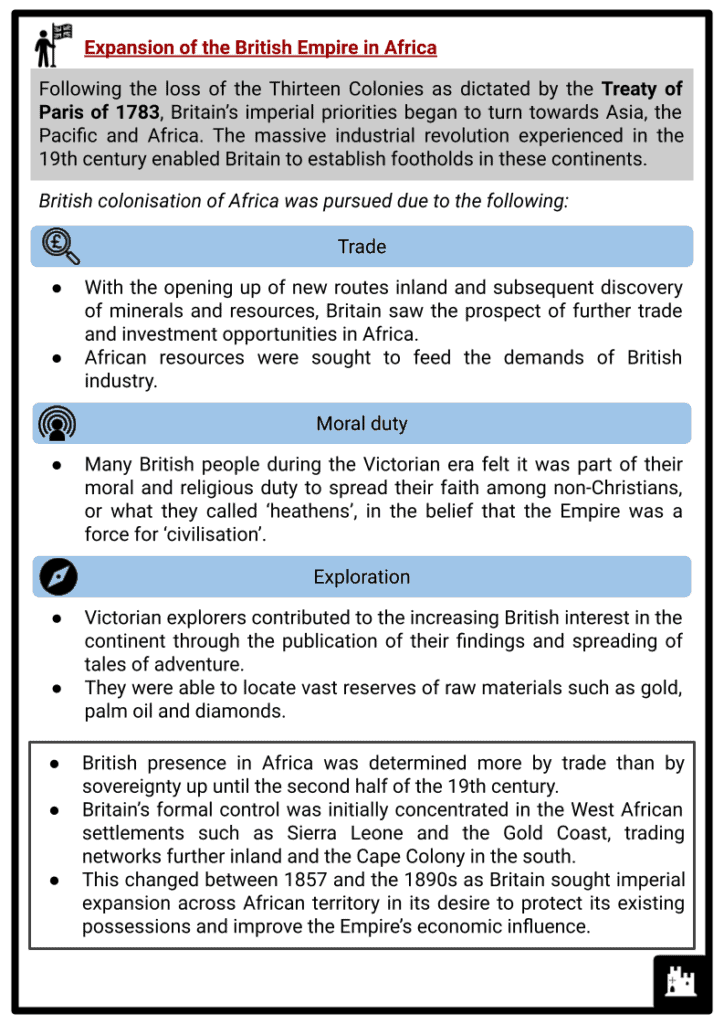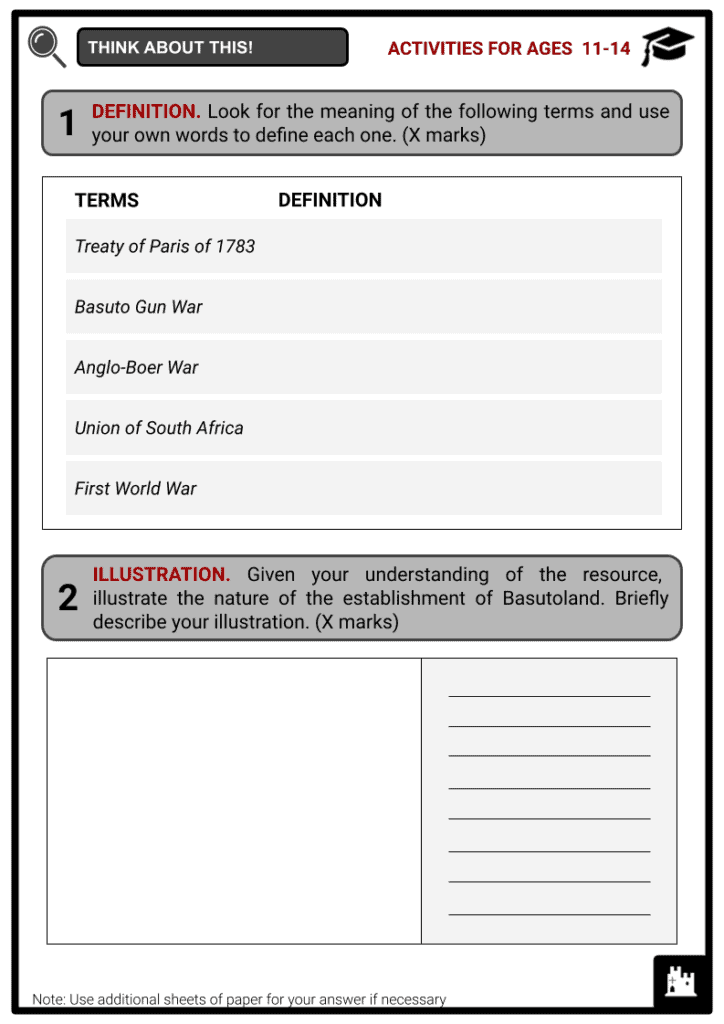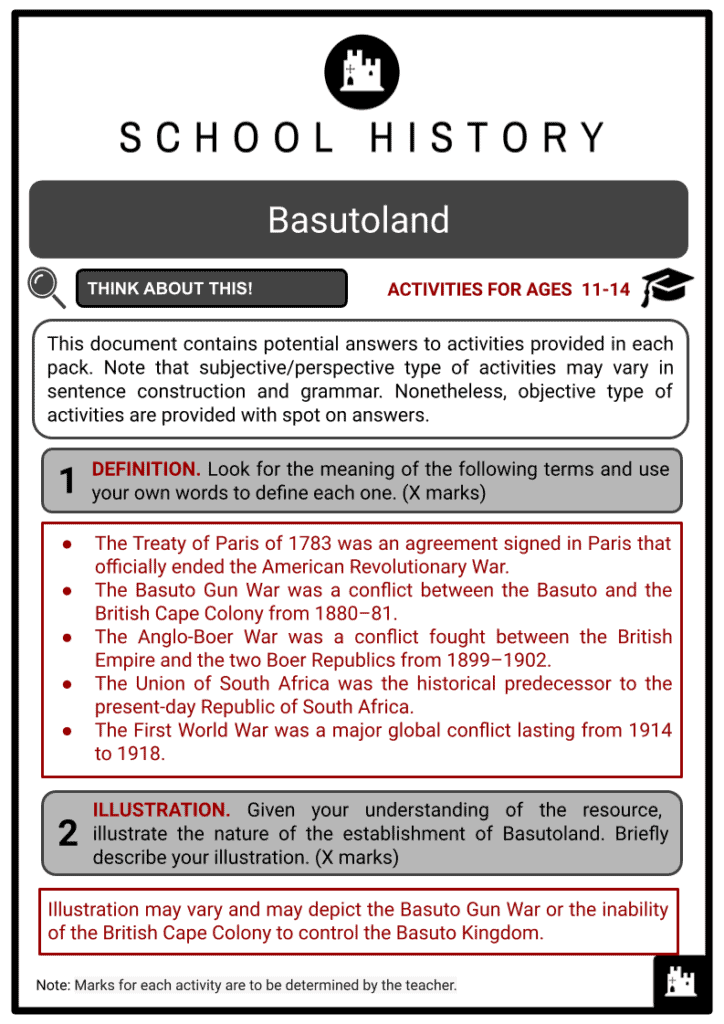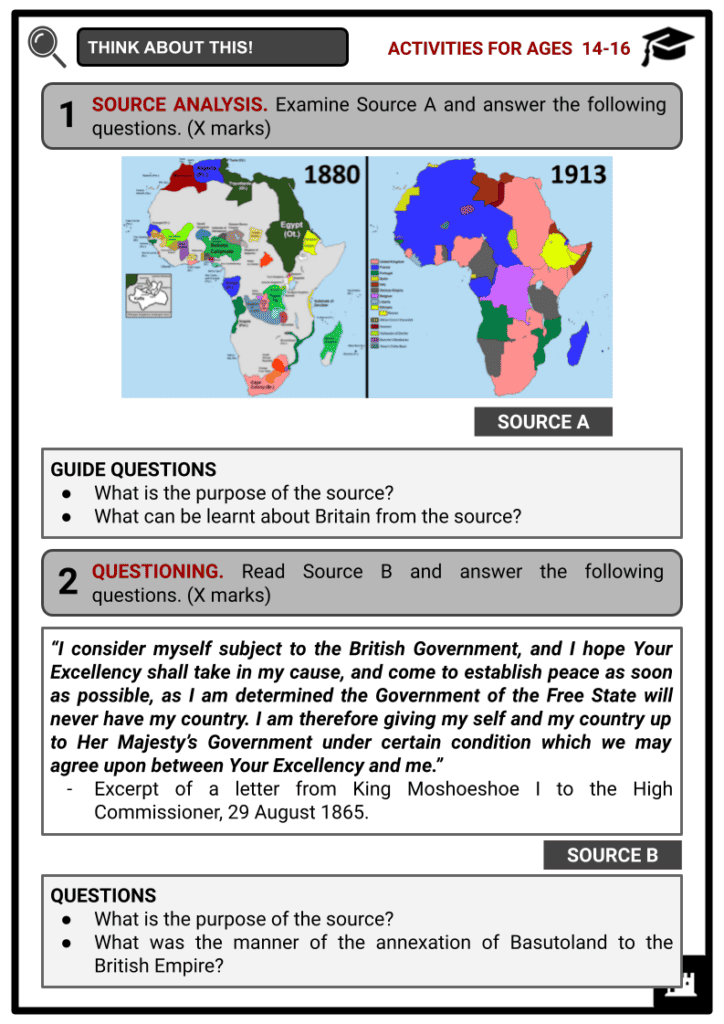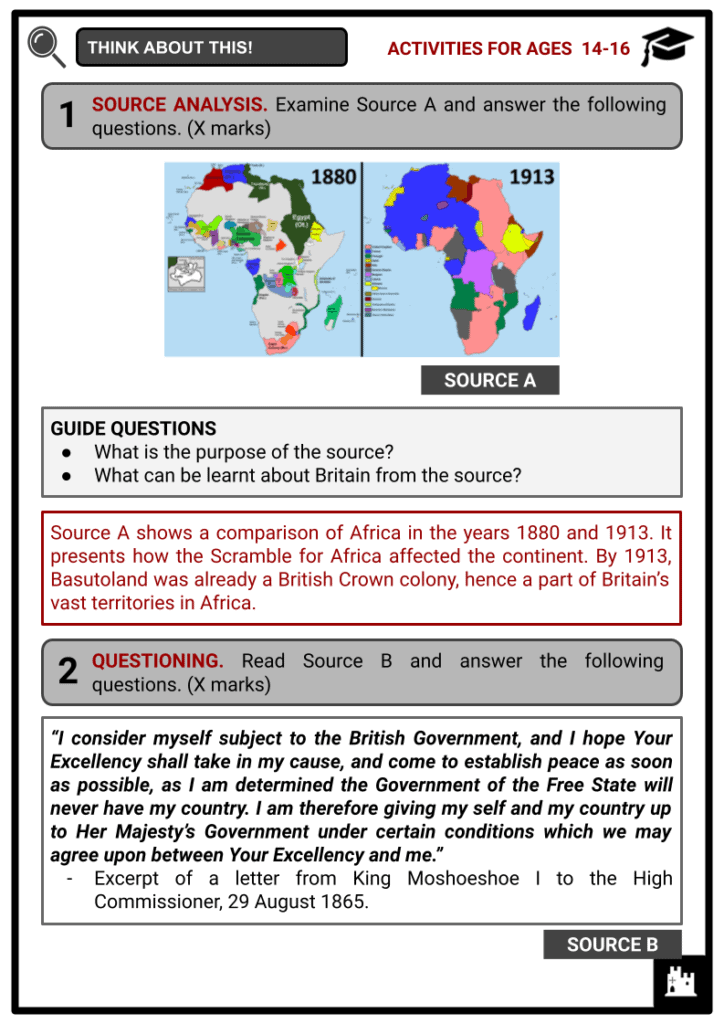Basutoland Worksheets
Do you want to save dozens of hours in time? Get your evenings and weekends back? Be able to teach about Basutoland to your students?
Our worksheet bundle includes a fact file and printable worksheets and student activities. Perfect for both the classroom and homeschooling!
Summary
- Expansion of the British Empire in Africa
- Annexation of Basutoland to the British Empire
- Development in Basutoland
- Path to independence
Key Facts And Information
Let’s know more about Basutoland!
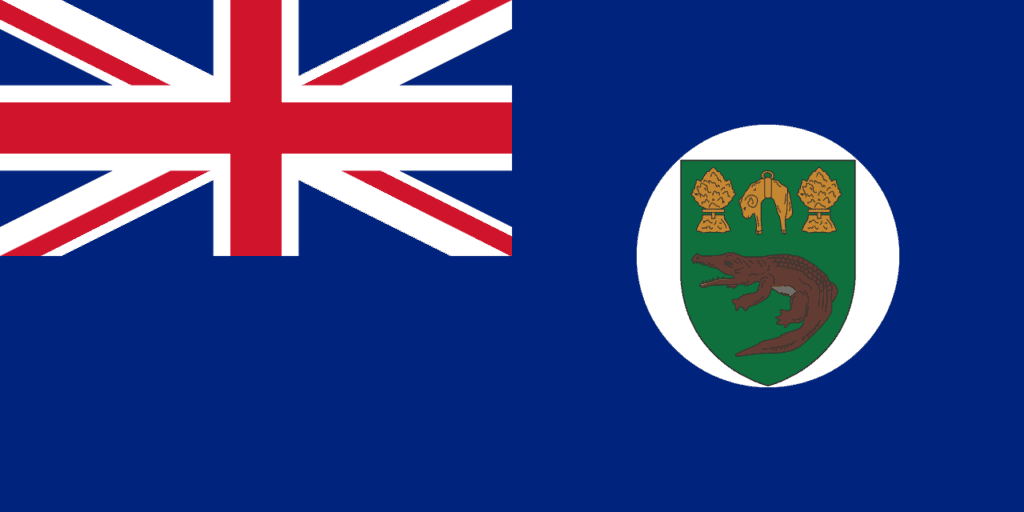
The Basuto Kingdom was placed under British protection in 1868 following King Moshoeshoe I’s appeal to Queen Victoria for assistance and security of his people against the Boers. It was then ruled by Cape Colony from 1871 until 1884, when it returned to Crown control under the name Basutoland. The colonial period of Basutoland was generally peaceful. The Basuto contributed to the Allied effort in both the First and Second World Wars. Nationalist parties were formed after the war, and in 1965 Basutoland became self-governing. In October 1966, it was granted independence and was renamed the Kingdom of Lesotho.
Expansion of the British Empire in Africa
- Following the loss of the Thirteen Colonies as dictated by the Treaty of Paris of 1783, Britain’s imperial priorities began to turn towards Asia, the Pacific and Africa. The massive industrial revolution experienced in the 19th century enabled Britain to establish footholds in these continents.
British colonisation of Africa was pursued due to the following:
- Trade
- With the opening up of new routes inland and subsequent discovery of minerals and resources, Britain saw the prospect of further trade and investment opportunities in Africa.
- African resources were sought to feed the demands of British industry.
- Moral duty
- Many British people during the Victorian era felt it was part of their moral and religious duty to spread their faith among non-Christians, or what they called ‘heathens’, in the belief that the Empire was a force for ‘civilisation’.
- Exploration
- Victorian explorers contributed to the increasing British interest in the continent through the publication of their findings and spreading of tales of adventure.
- They were able to locate vast reserves of raw materials such as gold, palm oil and diamonds.
- British presence in Africa was determined more by trade than by sovereignty up until the second half of the 19th century.
- Britain’s formal control was initially concentrated in the West African settlements such as Sierra Leone and the Gold Coast, trading networks further inland and the Cape Colony in the south.
- This changed between 1857 and the 1890s as Britain sought imperial expansion across African territory in its desire to protect its existing possessions and improve the Empire’s economic influence.
British Expansion in Africa (1857–1890)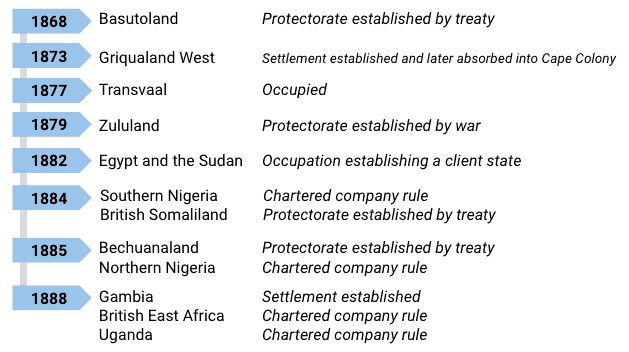
- Britain found a particular rival in France, which led to the formalisation of control of the former in areas where British traders had been operating. This was done by chartering companies, including the Royal Niger Company, the Imperial British East Africa Company and the British South Africa Company to enforce British claims in the continent.
Annexation of Basutoland to the British Empire
- The landlocked territory in southern Africa known as the Basuto Kingdom was formed by a local chief named Moshoeshoe in 1822 after consolidating the remnants of Sesotho-speaking peoples scattered by the Zulu and Matabele attacks. The local chief became King Moshoeshoe I in the 1830s, and his reign was plagued by a series of clashes between the Basuto and the European colonists and other local tribes. These clashes resulted in various agreements with the Boers and the British in the 1840s and 1850s.
- A series of wars was again fought between the Basuto and the Boers of the Orange Free State beginning in 1858, resulting in King Moshoeshoe I losing a portion of the western lowlands and the deaths of more than a thousand Basuto soldiers.
- The wars with the Boers ended when King Moshoeshoe I appealed to Queen Victoria for assistance in order to protect his people.
- In 1868, the Basuto Kingdom was placed under British protection and the Basuto were declared British subjects. The following year, the British signed a treaty with the Boers at Aliwal North, setting the boundaries of the protectorate.
- The death of King Moshoeshoe I in 1870 signalled the beginning of the colonial era of the British territory.
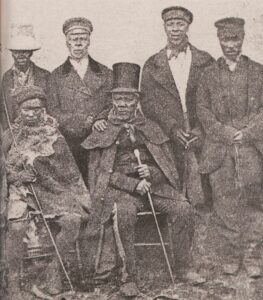
King Moshoeshoe I with his ministers - In 1871, the Basuto Kingdom was annexed to the Cape Colony, and when the rule of Cape Colony proved unpopular, the Basuto later rose in revolt, leading to the Basuto Gun War in 1880–1881.
- The British suffered significant casualties as a result of the conflict. An 1881 peace treaty was also unsuccessful in preventing sporadic fighting.
- In 1884, and owing to Cape Town’s inability to suppress the territory, the Basuto Kingdom returned to Crown control by formally becoming a Crown colony known as Basutoland. Maseru was its capital. Basutoland was under the direct authority of the Queen, with legislative and executive powers vested in the commissioner, while tribal chiefs retained effective internal power.
Development in Basutoland
- The resident commissioner, the British representative in Basutoland, presided in the Executive Council and worked through the national assembly of hereditary chiefs under one paramount chief. The paramount chief exercised a number of functions and was entrusted by the constitution with the authority to govern the land.
- At the time of the declaration of Basutoland as a British protectorate, Letsie I, son of King Moshoeshoe I, was the paramount chief. Sir Marshal James Clarke was appointed the first resident commissioner.
- A period of peace characterised the succeeding decade, hence the Basuto were able to focus their attention more and more on agricultural pursuits. Christian missionaries were also able to access the territory.
- In 1891, Basutoland entered into the customs union that was already in existence between the Orange Free State, Cape Colony and British Bechuanaland. This further increased trade.
- In 1898, the British colonial administrator Alfred Milner paid a visit to Basutoland on his way to Bloemfontein and was welcomed by the Basotho. Furthermore, the chiefs attended a large meeting at Maseru.
- When the Anglo-Boer War broke out in 1899, the chiefs declared their loyalty to Britain, but the territory remained passive and maintained its neutrality throughout the conflict. Both armies respected the territory’s position.
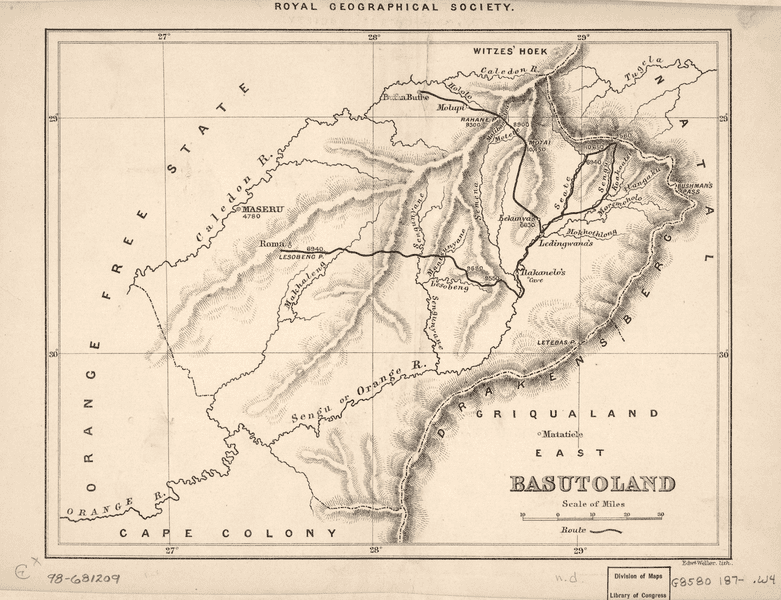
A late-19th century British map of Basutoland - A national council was founded to encourage the self-governing powers of the Basuto. It organised its first sitting in 1903.
- In 1905, Lerotholi, the paramount chief since 1891, died and was succeeded by his son Letsie II, after having been elected by the national council with the approval of the imperial government. In the same year, a railway connecting Maseru with the South African railway system was completed and proved advantageous to the community.
- In 1906, the Basuto did not participate in the Bambatha Rebellion, which was fought between the Zulu people and the British in the Natal colony.
- In 1910, the Union of South Africa was created. There emerged initiatives to transfer Basutoland to the Union. These, however, were resisted by the people, hence the plan was not actively pursued.
- Around 4,500 Basuto enlisted in the military in the First World War, most of whom served in the South African Native Labour Corps (SANLC) and fought on the Western Front. Furthermore, Basutoland contributed over £40,000 to the war effort.
- During the Second World War, Black citizens from the High Commission Territories of Swaziland, Basutoland and Bechuanaland were recruited into the African Auxiliary Pioneer Corps (AAPC) labour unit since the Afrikaners were opposed to armed Black units. The AAPC’s logistical support to the Allied war effort was significant during the North African, Dodecanese and Italian campaigns. About 21,000 Basuto enlisted during the war, 1,105 of whom died. The Basuto women also provided knitted warm clothing for the military during the conflict.
- When the South African National Party implemented its apartheid policies from 1948, the idea of incorporating Basutoland into the Union of South Africa grew more unpopular among the Basuto and the British colonial authorities.
Path to independence
- The early 20th century saw an increase in opposition to the colonial system. However, no organisations were successful in overthrowing the colonial administration and its conservativist allies. After the Second World War, to which the Basuto made considerable contributions, nationalist parties demanding independence emerged.
- Three main political parties were formed in this period: the Basutoland Congress Party (BCP) in 1952, under Ntsu Mokhehle; the more conservative Basutoland National Party (BNP) in 1958, under Chief Leabua Jonathan; and the Marema-Tlou Freedom Party (1963).
- In 1955, the Basutoland national council acquired the right to control the internal affairs of the territory.
- In 1959, a new constitution granted Basutoland its first elected legislature.
- In 1965, the general legislative elections with universal adult suffrage took place, in which the BNP dominated the new legislative assembly. Basutoland became self-governing that year.
- On 4 October 1965, Basutoland attained full independence from Britain and was renamed the Kingdom of Lesotho. It was governed by a constitutional monarchy with a bicameral Parliament comprising a Senate and an elected National Assembly. The paramount chief Moshoeshoe II was the king and Chief Jonathan was prime minister.
Image Sources
- https://upload.wikimedia.org/wikipedia/commons/thumb/e/e6/Unofficial_flag_of_Basutoland.svg/1280px-Unofficial_flag_of_Basutoland.svg.png
- https://upload.wikimedia.org/wikipedia/commons/thumb/7/7c/King_Moshoeshoe_of_the_Basotho_with_his_ministers.jpg/800px-King_Moshoeshoe_of_the_Basotho_with_his_ministers.jpg
- https://upload.wikimedia.org/wikipedia/commons/thumb/1/10/Basutoland_WDL657.png/781px-Basutoland_WDL657.png?20140311205655
Frequently Asked Questions
- What is Basutoland?
Basutoland was the former name of the Kingdom of Lesotho, a landlocked country located in Southern Africa.
- When did Basutoland gain independence?
Basutoland gained independence from British colonial rule on 4 October 1966 and became the Kingdom of Lesotho.
- What language is spoken in Lesotho?
Sesotho and English are the official languages of Lesotho.

